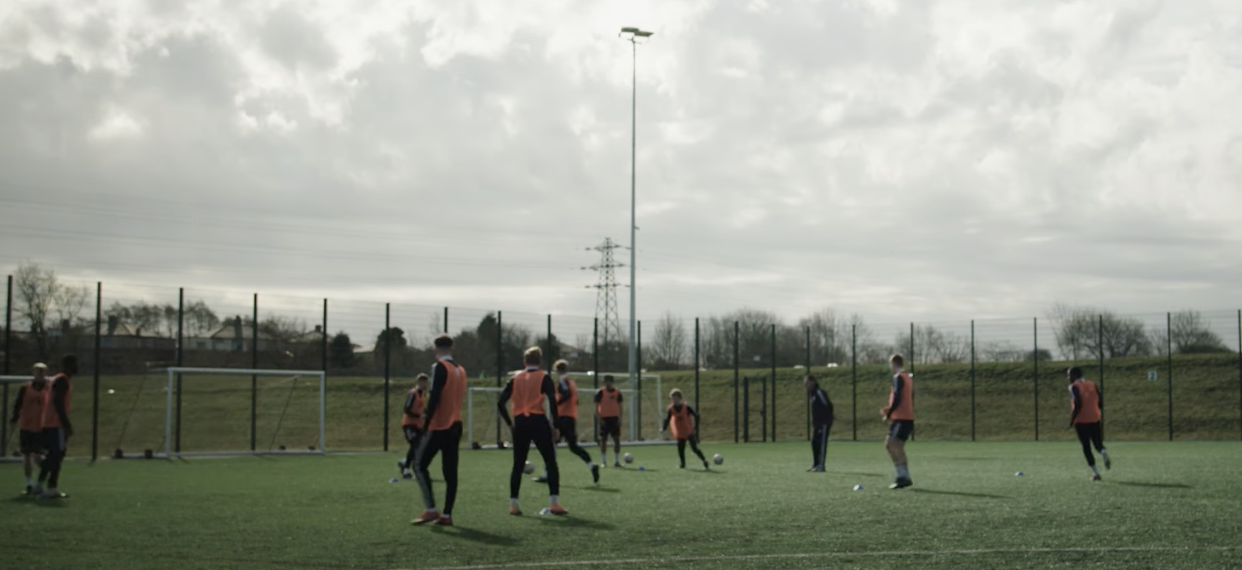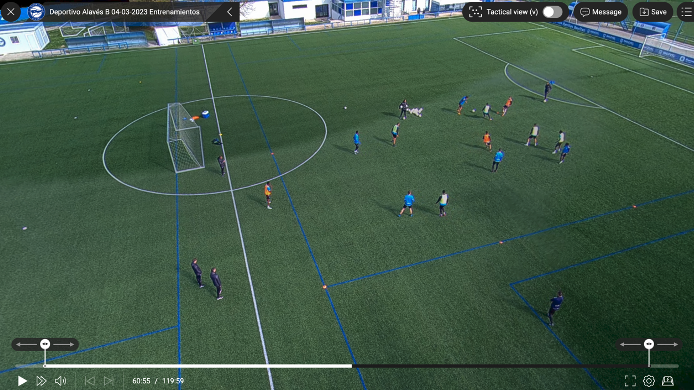When we think about video analysis, we usually see it as filming games to better understand what happened and report it to staff and players. It is a fantastic way to improve your team’s performance since it provides an objective visual reference.
However, if you have invested in technology to film your games, you should also use it to record training sessions. You can learn a lot from your players and improve as a coach by filming them.
Here are three reasons you should film your training sessions, whatever your level.
Please note this article focuses on football, but is equally applicable to other sports.

Why You Should Film Your Training Sessions
Performance analysis can feel like a cold science, exploited by top clubs to influence their training sessions and play during matches. However you don’t have to hire an astrophysicist like Manchester City, nor a chess champion like Liverpool FC or financial data expert like Real Madrid.
You and your team spend more time training than playing matches. At the amateur level, you might have two or three training sessions for every game. For semi-pro and pro clubs, this ration can climb up to 5:1. That provides two to five times more football to analyse.
At an amateur level, you can implement a simple, camera-led process to give feedback to your team to help them (and you) understand how you can improve. With very little gear, here are the reasons why you should record training sessions.
1. An Additional Resource for Coaches and Players
As a coach, you spend a lot of time on the training ground, and you might miss some of the action. Cameras don’t. They are an additional resource to see how your players act during training. By adding a filming system, whether it’s a simple camera or an automated recording system, you instantly double your number of staff. The fresh perspective offered by the camera provides a new viewpoint for you to see exactly what happened during the session.

For players, it is a way to better understand what is expected of them, allowing them to both appreciate positives and recognise their mistakes. You can edit and show them your footage post-session and use it for feedback. Before or during the session, you can show them good examples of a specific exercise, and how it helps in a real match. Players are then more aware of your expectations as a coach and can push themselves in a clear direction.
For junior players, communication is key. They have less playing experience than more senior teams and it can be harder for them to put your instructions into action. Visual footage is a great way to help this next generation of players understand what is expected of them. Using video you will also help them develop as players.
2. Run More Engaging Training Sessions
Before your training session, you can present the players with exactly what you are expecting in terms of specific exercises. You can then run an action-focused session once you are on the training ground and know you will be able to give relevant feedback to your players afterwards.
Indeed, feedback isn’t limited to games. Filming your training sessions will help you provide quick, objective feedback after the session (or during a break) when players will both remember what just happened, and can also appreciate it from another angle. They will better assimilate their training performance and be more receptive to your instructions.
Often players will perform better if they know they are being filmed. Luke Bornn (former Sacramento Kings Analyst) said that players improved their shooting accuracy following the team installing cameras in their training facility. Players were taking better shots because they knew the footage was being captured.
It’s also important to film your training games, as well as your tactical training sessions, from different angles to better analyse the position of players in offensive and defensive phases. It will help you see if they understand your instructions or if they deviate from what you expect them to do.

3. Improve as a Coach
Video footage is impartial. As a coach, you aren’t able to see everything happening on the field. Sometimes, you give instructions and you hope that they are understood and applied by the players. With video, you can objectively see whether your coaching is being applied or not. This will help you improve the way you communicate with your players to make sure they are following your instructions properly.
What teams do during their time on the pitch decides the winner of a game. Games can be decided by small details. Wrong positioning, a missed passing opportunity and so on. These details can be worked on the training ground during a session. With video, you will spot details that would take several sessions and games to recognise and change otherwise.
Speaking of details, filming can help you prepare specific tactics, such as set-piece preparation. You don’t have to adopt England’s Love Train strategy, but you can work on short and long corner kicks, long throw-ins and free kicks. Define your attacking routes to be able to apply them during games. Filming them in training will help your players understand your strategy, and help them implement it during games.
Having video also provides visual evidence if an injury occurs, providing medical staff with additional context that might otherwise be lost. This allows you to build more fitness-friendly training sessions.
How to Organise Your Filming
First, you will need to… record video! At the amateur level, you can start simple with a camcorder (or even smartphone) and a tripod to have a better view. The important thing here is to ensure the camera is recording the part of the field where the action is taking place. With a remote control, you can turn on the recording once you start your session and off between exercises. Filming your training games? Have a staff member or anybody from the club film the game for you to have footage that follows the action.
You can save yourself time and ensure nothing is missed by using an automated portable camera, like the BEPRO Cerberus. This captures a live panoramic video of the training field and is controlled through a mobile app. Footage is also stored for use after the session.
For clubs with a more permanent training pitch setup, you can also get a fixed camera system, like the one we offer at BEPRO. These systems also cover the whole pitch and can be easily controlled through your phone. Also, fixed camera providers often upload the footage straight to their cloud server, for you to be able to find your footage right after your session. It is a fast way of securing your training footage.
To organise your training footage, you should use an external cloud storage system, such as Google Drive or the BEPRO Library that comes as part of all our packages. It allows you to sort your work and share it with fellow staff members and players. Organising your footage doesn’t need to be complicated. A great place to start is with general observables and specific events. You could also do more general videos for each training exercise. General observables could be offensive/defensive and offensive/defensive Transitions. Specific events include goals, shots, setpieces, goalkeeper saves and any other event you wish to show your team. Having the library is an easy way to organise your footage. Below is an example of a library used by an amateur club using BEPRO.

A library is a tool that can help you organise your training session footage. You are then free to determine who sees which file. For instance, in the GK file below, our user would only share the file with their three goalkeepers and the GK coach.
Finally, you will need to communicate your work to your players. Online, you can use messaging apps such as WhatsApp, or in-platform functions to share your videos, such as BEPRO’s inbuilt Messenger service. You can also download the edited clips to put them in a presentation for clubhouse feedback sessions (our Editor has this as a built-in feature).

Take Your Training to the Next Level with Video Analysis
Filming football is not limited to your matches. Getting the most out of your training sessions, understanding how you can improve your players and your communication with them is key to getting better performances out of your team.
You will play more during your training sessions than your matches and have more time for adjustments during them. Filming, sharing and analysing video will help your players engage with your sessions and get ahead of the competition.
***
BEPRO exists to help all those involved in sport, at any level, improve their performances and reach their goals through technology.



.png)






